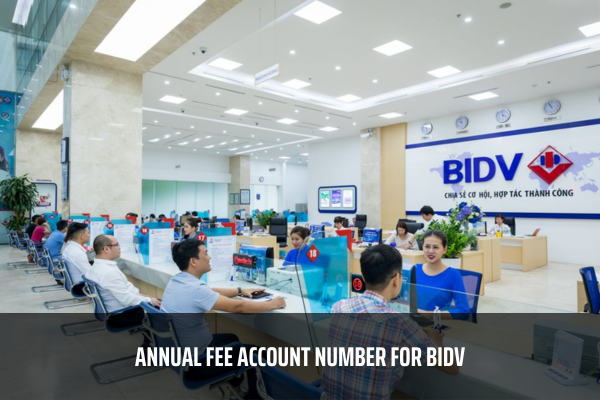Vietnam: What is the annual fee account number for BIDV? What is the fastest way to look up the annual fee account number for BIDV?
- Vietnam: What is the annual fee account number for BIDV? What is the fastest way to look up the annual fee account number for BIDV?
- What is the principle of BIDV's annual fee collection for domestic debit cards in Vietnam?
- What are the regulations on the responsibilities of organizations of card issuance in Vietnam?
Vietnam: What is the annual fee account number for BIDV? What is the fastest way to look up the annual fee account number for BIDV?
The annual fee for BIDV is an annual amount that users have to pay to the bank to use the features and services of the card.
The annual fee is completely different from the account maintenance fee. The account maintenance fee is calculated monthly and is intended to manage and maintain the user's account (i.e., allowing customers to perform common transactions such as transfers, withdrawals, and balance inquiries quickly and easily).
The annual fee account number for BIDV is the ATM account number or the credit card account number, which allows customers to perform banking transactions such as transferring money, receiving money, and checking account information. In other words, the annual fee account for BIDV is the account number from which the bank will automatically deduct the annual fee to ensure that the card always operates with the best features and quality.
However, not all types of accounts and cards from BIDV require an annual fee. To determine whether a specific type of account or card requires an annual fee, you need to consider the payment function. Cards that do not have a payment function usually do not require an annual fee.
Some types of cards at BIDV that require an annual fee include:
- Payment card
- Credit card
- Debit card
You can refer to the following methods to look up the annual fee account number for BIDV:
(1) Check the annual fee account at BIDV ATMs
(2) Check at BIDV branches
(3) Contact BIDV's hotline 1900 9247 to inquire about the annual fee account number at the bank.
(4) Look it up through the BIDV Smart Banking app
(5) Check it via BIDV SMS Banking
Source: BIDV Bank's official website.

Vietnam: What is the annual fee account number for BIDV? What is the fastest way to look up the annual fee account number for BIDV? (Image from the Internet)
What is the principle of BIDV's annual fee collection for domestic debit cards in Vietnam?
Article 4 of Circular 35/2012/TT-NHNN stipulates the principle of collection of card service charges as follows:
Principle of collection of card service charges
1. The organizations issued card are permitted to collect card service charges in according to types of charge, levels of charge which specified in the charge table of card service by their General Directors (Directors) but must ensure to in the framework and roadmap stipulated for types of charges stated in the Framework of domestic debit card service charges (Annex) promulgated together with this Circular.
2. The organizations of card issuance are not permitted to collect additionally charge types, excluding the card service charge table have been promulgated.
3. The organizations of card issuance are not permitted to collect charges from card holders for unsuccessful card transaction, or error card transaction not due of fault of card holders.
4. Organizations of card payment, organizations of card commutation are not permitted to collect card service charge for card holders.
5. Units of card acceptance are not permitted to collect POS transaction charge for card holders.
Thus, the principle of BIDV's annual fee collection for domestic debit cards includes:
- The organizations issued card are permitted to collect card service charges in according to types of charge, levels of charge which specified in the charge table of card service by their General Directors (Directors) but must ensure to in the framework and roadmap stipulated for types of charges stated in the Framework of domestic debit card service charges (Annex) promulgated together with Circular 35/2012/TT-NHNN.
- The organizations of card issuance are not permitted to collect additionally charge types, excluding the card service charge table have been promulgated.
- The organizations of card issuance are not permitted to collect charges from card holders for unsuccessful card transaction, or error card transaction not due of fault of card holders.
- Organizations of card payment, organizations of card commutation are not permitted to collect card service charge for card holders.
- Units of card acceptance are not permitted to collect POS transaction charge for card holders.
What are the regulations on the responsibilities of organizations of card issuance in Vietnam?
Article 5 of Circular 35/2012/TT-NHNN stipulates the responsibilities of organizations of card issuance as follows:
- At least 15 days before applying the card service charge table (promulgation of new or adjustment, amendment), organizations of card issuance must send their unit's card service charge table to the State bank (Department of payment and agencies of bank inspection and supervision) for report and supervision.
- Posting up in publicity the card service charge table in accordance to provisions of law.
- Popularizing, guiding customers about card services, process of manipulation in card use, the current charge table of card services and other provisions relating to their unit’s card services, ensuring that customers have enough necessary information to consider, select and decide on use of card services.
- Answering, handling timely questions, complaints or technical problems for card holders. Returning the transaction amounts collected for card holders if the card transaction is unsuccessful and pay compensation for damages for card holders as prescribed by law if damages happen due to fault of organizations of card issuance.
- Implementing strictly, fully provisions of the State bank on equipping, management, operation, use and assurance of safety of activities of ATM and the equipment reading card.
LawNet